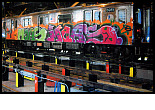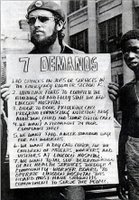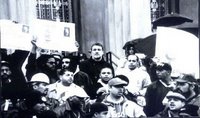James Brown, the ‘Godfather of Soul’, Dies at 73
The New York Times
December 25, 2006
James Brown, the ‘Godfather of Soul’, Dies at 73
By JON PARELES
James Brown, the singer, songwriter, bandleader and dancer, who indelibly transformed 20th-century music, died early today at Emory Crawford Long Hospital in Atlanta, where he been admitted on Saturday with pneumonia, his agent, Frank Copsidas, said. Mr. Brown was 73 years old and lived in Beech Island, S.C., near the Georgia border.
Mr. Copsidas said in an interview that Mr. Brown had participated in his annual Christmas toy giveaway in Atlanta on Friday, but had been hospitalized after a dentist he saw on Saturday for a routine visit advised him to see a doctor.
Mr. Brown's condition did not seem to be life-threatening, Mr. Copsidas said. On the contrary, after cancelling performances planned for mid-week, Mr. Brown on Sunday night got his doctor's approval for going ahead with a show on Saturday in New Jersey and one on New Year's Eve at B.B. King's nightclub in New York.
He said Mr. Brown used one of his best-known expressions to convey his determination to perform, saying, "I'm the hardest working man in show business, and I'm not going to let them down.''
Mr. Brown died at 1:45 am today as a result of congestive heart failure caused by the pneumonia, Mr. Copsidas said.
Over a career that lasted more than 50 years, Mr. Brown did not only call himself "the hardest working man in show business." He also went by "Mr. Dynamite," "Soul Brother No. 1," "the Minister of Super Heavy Funk" and "the Godfather of Soul," and he was all of those and more.
Mr. Brown's music was sweaty and complex, disciplined and wild, lusty and socially conscious. Beyond his dozens of hits, Mr. Brown forged an entire musical idiom that is now a foundation of pop worldwide.
"I taught them everything they know, but not everything I know," he wrote in an autobiography.
The funk Mr. Brown introduced in his 1965 hit, "Papa's Got a Brand New Bag," was both deeply rooted in Africa and thoroughly American. Songs like "I Got You (I Feel Good)," "Cold Sweat," "Get Up (I Feel Like Being a) Sex Machine" and "Hot Pants" found the percussive side of every instrument and meshed sharply syncopated patterns into kinetic polyrhythms that made people dance.
Mr. Brown's innovations reverberated through the soul and rhythm-and-blues of the 1970's and the hip-hop of the next three decades. The beat of a 1970 instrumental, "Funky Drummer," may well be the most widely sampled rhythm in hip-hop.
Mr. Brown's stage moves -- the spins, the quick shuffles, the knee-drops, the splits -- were imitated by performers who tried to match his stamina, from Mick Jagger to Michael Jackson, while they were admired by the many more who could not. And especially during the 1960's, Mr. Brown was a political force; his 1968 song, "Say It Loud -- I'm Black and I'm Proud," changed America's racial vocabulary. He was never politically predictable; in 1972, he endorsed the re-election of Richard Nixon.
Mr. Brown led a turbulent life, and served prison time as both a teenager and an adult. He was a stern taskmaster who fined his band members for missed notes or imperfect shoeshines. He was an entrepreneur who, at the end of the 1960's, owned his own publishing company, three radio stations and his own Lear Jet (which he would have to sell to pay back taxes). And he performed constantly -- as much as 51 weeks a year in his prime.
Mr. Brown was born May 3, 1933 in a one-room shack in Barnwell, S.C. As he would later tell it, midwives thought he was stillborn, but his body stayed warm and he was revived. When his parents separated four years later, he was left in the care of his aunt Honey, who ran a brothel in Augusta, Ga. As a boy, he earned pennies buck-dancing for soldiers; he also picked cotton and shined shoes.
He was dismissed from school because his clothes were too ragged.
He was imprisoned for petty theft in 1949 after breaking into a car, and paroled three years later. While in prison, he sang in a gospel group, and after he was released he joined a group led by Bobby Byrd, calling itself the Gospel Starlighters for church music, the Avons for pop, and eventually, as a rhythm-and-blues group, the Flames. Mr. Brown played drums with the group and traded off lead vocals with other members. But with his powerful voice and frenzied, acrobatic dancing, he soon emerged as the frontman.
In 1955, the Flames recorded "Please Please Please" in the basement studio of a radio station in Macon, Ga. A talent scout heard it on local radio and signed the Flames to a recording contract with King Records. A second version, recorded in Cincinnati in 1956, became a million-selling single. Nine follow-up singles were flops until, in 1958 a gospel-rooted ballad, "Try Me," went to No. 1 on the rhythm-and-blues chart. Mr. Brown followed up with more ballads, although the Flames' stage shows would turn them into long, frenzied crescendos. His trademark routine of collapsing onstage, having a cape thrown over him and tossing it away for one more reprise, again and again, would leave audiences shouting for more.
In 1960, Mr. Brown's version of "Think" put a choppy, Latin-flavored beat -- hinting at the funk to come -- behind a sustained vocal and pushed him back into the R&B Top 10 and the pop Top 40.
Mr. Brown had his first Top 20 pop hit in 1963 with "Prisoner of Love," a ballad backed by an orchestra. But before those sessions, he had done a series of shows at the Apollo Theater in Harlem and the one on Oct. 24, 1962, was recorded. Released in 1963, "Live at the Apollo" -- with screaming fans and galvanizing crescendos -- revealed what the rhythm-and-blues circuit already knew, and became the No. 2 album nationwide.
James Brown and the Famous Flames toured nonstop through the 1960's. They were filmed in California for the "The T.A.M.I. Show," released in 1965, which shows Mick Jagger trying to pick up Mr. Brown's dance moves.
By the mid-1960's, Mr. Brown was producing his own recording sessions. In February, 1965, with "Papa's Got a Brand New Bag," he decided to shift the beat of his band: from the one-TWO-three-FOUR backbeat to ONE-two-THREE-four. "I changed from the upbeat to the downbeat. Simple as that, really," Mr. Brown said in 1990.
Actually, it wasn't that simple; drums, rhythm guitar and horns all kicked around the beat from different angles. Through the 1960's and into the 1970's, Mr. Brown would make his funk ever more complex while stripping harmony to a bare minimum in songs like "Cold Sweat." He didn't immediately abandon ballads; songs like "It's a Man's Man's Man's World," a No. 1 R&B hit in 1966, mixed aching, bluesy lines with wrenching screams.
Amid the civil rights ferment of the 1960's, Mr. Brown used his fame and music for social messages. He released "Don't Be a Dropout" in 1966, and met with Vice President Hubert Humphrey to promote a stay-in-school initiative. Two years later, "Say It Loud -- I'm Black and I'm Proud" insisted, "We won't quit movin' until we get what we deserve." When Martin Luther King Jr. was murdered in 1968, Mr. Brown was due to perform in Boston. Instead of canceling his show, he had it televised, and Boston was spared the riots that took place in other cities. "Don't just react in a way that's going to destroy your community," he urged.
By the late 1960's, Mr. Brown's funk was part of pop, R&B and jazz: in his own hits, in songs by Sly and the Family Stone and the Temptations, and in the music of Miles Davis. It was also creating a sensation in Africa, where it would shape the Afrobeat of Fela Kuti, the juju of King Sunny Ade and the mbalax of Youssou N'Dour. Musicians who left Mr. Brown's bands would also have a direct role in 1970's and 1980's funk; the saxophonist Maceo Parker, the trombonist Fred Wesley and the bassist Booty Collins were part of George Clinton's Parliament-Funkadelic, and Mr. Parker also worked with Prince.
Through the early 1970's, Mr. Brown's songs filled dance floors. His self-described "super heavy funk" gave him No. 1 R&B hits and Top 20 pop hits with "Give It Up or Turnit a Loose" and "Mother Popcorn" in 1969, "Super Bad Pts. 1 & 2" in 1970, "Hot Pants" and "Make It Funky" in 1971, "Get on the Good Foot Pt. 1" in 1972 and "The Payback Pt. 1" in 1974. He provided soundtracks for blaxploitation movies like "Black Caesar" and "Slaughter's Big Rip-Off," and performed at the 1974 "Rumble in the Jungle" boxing match between Muhammad Ali and George Foreman in Zaire.
The rise of disco -- a much simplified version of Mr. Brown's funk -- knocked him out of the Top 40 in the late 1970's. But an appearance in "The Blues Brothers" in 1980 started a career resurgence, and in 1985, Mr. Brown had a pop hit, peaking at No. 4, with "Living in America," the song he performed in the movie "Rocky IV"; it won him his second Grammy Award for Best Rhythm and Blues Recording. That year, he was inducted into the Rock and Roll Hall of Fame as one of its first members.
Meanwhile, hip-hop had arrived, with Mr. Brown's music often providing the beat. L.L. Cool J., Public Enemy, De La Soul and the Beastie Boys are among the more than 100 acts that have sampled Clyde Stubblefield's drumming on "Funky Drummer" alone. In 1984, Mr. Brown collaborated with the influential rapper Afrika Bambaataa on the single "Unity." He kept recording into the 21st century, including a 2002 studio album, "The Next Step."
Mr. Brown maintained a nearly constant touring schedule despite a tumultuous personal life. During the 1970's the Internal Revenue Service demanded $4.5 million in unpaid taxes; the jet and radio stations were sold. His oldest son, Teddy, died in a car accident in 1973.
In 1987, intoxicated on PCP, he burst into an insurance seminar adjoining his own office in Augusta, Ga., then led police on a car chase across the South Carolina border. He was sentenced to a prison for carrying a deadly weapon at a public gathering, attempting to flee a police officer and driving under the influence of drugs, and was released in 1991. In 1998, after discharging a rifle and another car chase, he was sentenced to a 90-day drug rehabilitation program. He was officially pardoned by South Carolina in 2003, but arrested again in 2004 on charges of domestic violence against his fourth wife, Tomi Rae Hynie, a former backup singer. "I would never hurt my wife," he said in a statement at the time. "I love her very much."
She survives him along with their son, James Brown II, and three other children, according to The Associated Press.
In 1999, Mr. Brown made a deal to receive $30 million in bonds against advance publishing royalties. This year, however, he sought to refinance the bonds with a new loan. The banker who had made the original deal, David Pullman, objected to the terms and Mr. Brown filed a lawsuit against him in July.
But Mr. Brown's status as an American icon had long since been assured. He received a Grammy Lifetime Achievement Award in 1992 and a Kennedy Center Honors in 2003, the same year that Michael Jackson presented him with a BET Award for lifetime achievement. In a 1990 interview with the New York Times, he said, "I was always 25 years ahead of my time."
John O’Neil contributed reporting.




